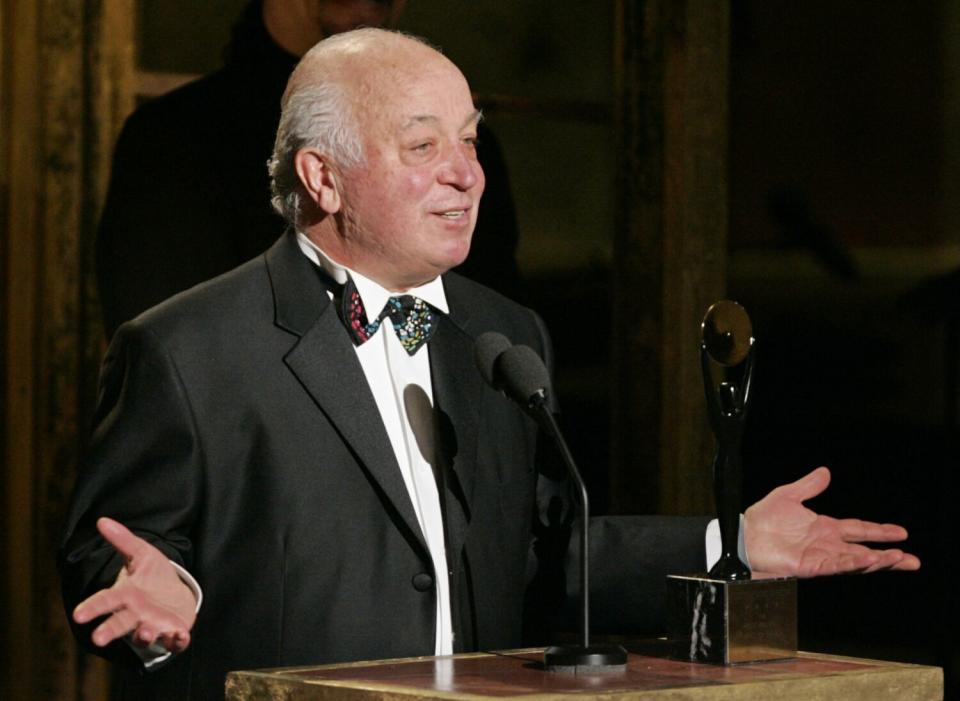Seymour Stein, record executive who signed Madonna, Ramones and Talking Heads, dies at 80

Seymour Stein, the record industry executive who helped shape the sound of 20th century pop music by signing the Ramones, Talking Heads, the Pretenders and Madonna to his Sire label, died on Sunday in Los Angeles. He was 80.
The cause of death was cancer, said his daughter, Mandy Stein.
Stein belonged to a rarefied group of music executives who gained fame on their own accord. His notoriety was so great and lasting that the Scottish indie-pop outfit Belle and Sebastian wrote a song chronicling his attempt to sign them to Sire in 1996, more than 20 years after the label's golden era began with the release of the first album by punk originators the Ramones in 1975.
Sire released some of the most adventurous music from punk and new wave acts. Stein brought Talking Heads, a cerebral CBGB cohort of the Ramones, to Sire in 1976, then expanded the label’s roster with Chrissie Hynde’s swaggering Pretenders and the noir-ish vistas of U.K. post-punk outfit Echo & the Bunnymen.

All other Sire signings were overshadowed by Madonna, a New York-based singer whose stylish dance pop refashioned the sound and appearance of pop in the 1980s. Stein famously signed Madonna while laid up in a hospital bed, and she stuck with the label as she became the biggest pop star in the world.
Stein’s influence extended outside of Sire. While acting as president of the label — he stayed in that position until his retirement in 2018 — he helped co-found the Rock and Roll Hall of Fame in 1983. He was inducted into the institution in 2005.
But before Stein was a mover and shaker, his passion for music helped change the contours of the industry. As an intern at Billboard magazine in 1958, he was part of the team that developed the Hot 100, the chart that became the industry standard. In his 2018 memoir “Siren Song: My Life in Music," Stein wrote: “My business was turning great music into hit records.”
Stein was born Seymour Steinbigle in Brooklyn, N.Y., on April 18, 1942. Popular music became the center of his life at an early age. In 2015, he said, “From the time I was 9 years old, I knew I wanted to be in the music business.” He made his first step into the business when he was 13, asking the music trade newspaper Billboard if he could copy old pop, country and R&B charts by hand. It took him two years to complete the project, after which the magazine brought him aboard to write reviews. Stein joined the magazine after high school graduation.
By the early 1960s, Stein turned his attention to record labels. He interned for King Records, an R&B and country label based in Cincinnati that claimed James Brown as one of its biggest stars, before becoming a staffer in 1961. Syd Nathan, the label’s founder, suggested to Seymour he shorten his last name to Stein.
He then joined Red Bird Records, a New York-based label founded by songwriters Jerry Leiber and Mike Stoller and record man George Goldner. Specializing in girl-group pop — its first big hit was “Chapel of Love” by the Dixie Cups, which went to No. 1 in 1964 — Red Bird collapsed in 1966, leaving Stein to partner with Richard Gottehrer, who had his own girl-group past as co-songwriter and co-producer of the Angels’ “My Boyfriend’s Back.” The pair formed Sire Records in 1966, opening an office in the Brill Building.
Initially, Sire concentrated on licensing recordings from British or European recording acts for the U.S. market. While the label stayed afloat for several years, it amounted to little more than a cult label, releasing British blues and prog rock. Occasionally, they’d release a noteworthy record: a couple of early Fleetwood Mac sessions when they were led by Peter Green, plus albums by Climax Blues Band, Barclay James Harvest and Kevin Ayers. Commercial success didn’t arrive until 1973, when Focus, a group of oddball Dutch art-rockers, channeled their eccentricities into “Hocus Pocus,” a bombastic blast of neo-classicism with a yodeled hook. It was weird enough to become a novelty smash, reaching the Top 10 on the Billboard Hot 100.
The success of “Hocus Pocus” shifted the power structure at Sire. Gottehrer decided to leave the label, while Stein concentrated on finding new recording artists. Tipped off by his wife, Linda — she’d soon wind up as the band’s manager — Stein hit pay dirt with the Ramones, the leather-clad purveyors of buzzsaw bubble gum. The Ramones’ eponymous 1975 debut didn’t sell initially but helped gave Stein direction for Sire: He now would steer the label toward punk and its offshoots. Sire’s next notable signing was Talking Heads, a kinetic, quirky outfit led by David Byrne that became one of the signature bands of post-punk and new wave.

Warner Bros. acquired Sire in 1978 but Stein remained the label’s president, helping shape a distinctive identity for the imprint. Stein would sign such emerging rockers as London-by-way-of-Akron, Ohio's Pretenders and Minneapolis' Replacements while licensing records for the U.S. from renowned British indie labels Rough Trade and 4AD. This meant that Sire was the American home for such major acts as the Smiths, Depeche Mode, Echo & the Bunnymen, Erasure and My Bloody Valentine. Sire showcased its roster on a series of CD compilations called “Just Say Yes” that now stand as time capsules of pre-Nirvana alternative rock.
While Sire ruled the underground it was also home to Madonna, one of the biggest pop stars of the 1980s and ’90s. Stein signed Madonna based on her demo for “Everybody." In short order, her self-titled 1983 debut generated four dance hits before “Lucky Star” and “Borderline” brought her into the pop Top 10. After 1984’s “Like a Virgin,” she’d be a fixture in pop culture, her success allowing Sire to branch into hip-hop with Ice-T and country with k.d. lang. Sire also became home to Lou Reed’s comeback, which started with “New York,” his label debut from 1988.
Stein remained active in the 1990s, but Sire wasn’t as central to the culture after the rise of grunge in the early 1990s. Over the next decades, it would develop notable acts such as Tegan and Sara and Regina Spektor, but by the 2010s the label’s cultural footprint had diminished. Stein continued to work at Sire and at Warner — he became a senior A&R executive for the parent label in 2013 — until his retirement in 2018.
Stein is survived by his daughter Mandy, a filmmaker specializing in music documentaries; three grandchildren; and Ann Wiederkehr, his sister. His former wife, Linda, was murdered by her assistant in 2007. The couple’s other daughter, Samantha Jacobs, died of brain cancer in 2013.
This story originally appeared in Los Angeles Times.

